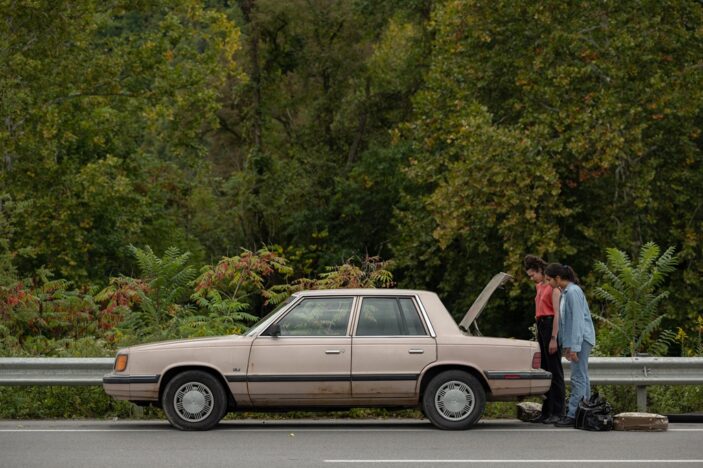
If there was ever an indication as to how separately the Coen Brothers think when they’re left to their own devices, one only needs to look at what Ethan Coen has concocted with Drive-Away Dolls. Miles apart from Joel Coen’s ahistorical thriller The Tragedy of Macbeth, Drive-Away Dolls, a collaboration with Ethan’s wife, Tricia Cooke, is an often unhinged, unapologetically queer B-movie that takes no prisoners and, quite frankly, isn’t likely to give a fuck if you like it or not.
Set in the 90s – yes, it can actually be considered a period piece – Dolls centres around Jamie (Margaret Qualley) and Marian (Geraldine Viswanathan), a duo of lesbians who couldn’t be more opposite from one another. Jamie is an uninhibited free spirit, floating from one lover to the next (sometimes even when she’s supposedly dedicated to one already), continually looking out to satisfy her libido above all else. Marian is far more reserved – don’t even ask her how long it’s been since she last had sex – but knows she needs the unpredictability of Jamie in her life to keep herself motivated.
In a case of unexpectedly well-placed timing, Jamie needs to skip town following her breakup with volatile police officer Sukie Schenkleman (Beanie Feldstein), so she hitches a ride to Tallahassee with Marian, who’s headed to visit family. Making their way through the assistance of a drive-away service, Jamie and Marian’s Tallahassee destination happens to coincide with that of Arliss (Joey Slotnik) and Flint (C.J. Wilson), two crims who were supposed to pick up the car that the service proprietor, Curlie (Bill Camp), has unknowingly given to the girls. Shit is very much about to hit the fan, especially because the reason Arliss and Flint need said vehicle is related to an apparent boy-scout-clean senator (Matt Damon) whose reputation lies in the balance of the suitcase the girls are transporting.
Leaning into the crime-centred humour of the Coen’s own back catalogue, as well as indulging in the 70s sexploitation film craze, Drive-Away Dolls utilises its queer personality in both manners that prove shocking and tender. As much as this is new territory for Coen, Drive-Away Dolls has an authentic throughline with Cooke’s hand as a writer. She openly identifies as a lesbian (and did before she and Coen married – they both have separate partners, for those playing at home) and her experience is flitted across the film’s wild 85 minute running time.
Cooke’s involvement means the film gets away with some of its more crass moments, as well as the stinging dialogue that, whilst wasn’t thought of twice in the 90s, still has a bit of a shock reaction when heard today; at least to sensitive ears. It’s a film that doesn’t care if you think it’s too crude, and as much as the marketing hypes up the fact that it’s coming from a Coen brother – and therefore uses such respected straight-leaning titles as The Big Lebowski and Fargo – it’s a deliciously queer film that’s sure to piss off the unprepared masses.
But as bold as it is, it occasionally feels like it’s trying to drive alongside the Coen mystique that served many of their collaborations so well. There’s splatters of graphic violence throughout and even psychedelic cutaways that bring the aforementioned Fargo and Lebowski to mind. To some it may all feel a little too disconnected, but there’s no denying that Drive-Away Dolls is seldom boring, with the screen constantly supplying visuals that prove difficult to turn away from. And much of that ultimately comes down to the impressive cast Coen and Cooke have assembled, with Qualley and Viswanathan leading the charge with ease. With her thick Southern drawl and penchant for quick-fire dialogue, Qualley is the more theatrical character – she almost feels designed from the Coen Brothers guide book – but she layers it with a sincerity that prevents it from ever feeling like a caricature. Viswanathan is never anything other than effortlessly endearing, and so much of the film succeeds because we want her character to succeed so much. And despite their at-odds personalities, the chemistry between the two makes it believable that such opposing forces would be drawn to each other.
Decidedly not for all tastes, Drive-Away Dolls is a violent, crime-laced, raunchy sex adventure that manages to achieve such ingredients without the addition of a man. If you’re willing to give into Coen and Cooke’s obviously unethical comedy then you could very well enjoy riding shotgun with these particular Dolls. If not? Check if the bus is still running.
![]()
![]()
![]()
![]()
![]()
THREE AND A HALF STARS (OUT OF FIVE)
Drive-Away Dolls is now screening in Australian theatres.
